Leander G. & Nancy (Morris) Ellis Ranch, ~1895
Research by Ann Howard. Images provided by Geyserville Historical Society
Leander G. & Nancy (Morris) Ellis Ranch, ~1895
Research by Ann Howard. Images provided by Geyserville Historical Society

Our Early and Late History
A bit of our history: the California Gold Rush by wagon train and the Panama isthmus, land grabs, murder, squatters, rebellion, early diversified farming, Sonoma County Supervisor, winegrape growing by the 1880s, Judge, Justice of the Peace, Sonoma County Sheriff, award winning hillside grown wine, last female heir farms Ellis Ranch into her 70s and wins awards for her Zinfandel and Cabernet. Now this prized and historic land is preparing to produce some of the first Climate Adaptation Certified Wine.
Rancho Tzabaco (encompasing present day Geyserville in northern Sonoma County) is given in a Land Grant to Jose German Pina by Mexican Governor Manuel Micheltorena.

California becomes a territory of the U.S.
John H. and Jane (Franics) Morris, with daughter Nancy Eleanor Morris and other children, leave Missouri by wagon train to join Gold Rush to California.

Squatters kill Pina’s heir and overtake Rancho Tzabaco. John Morris takes squatter’s title to part of historical Ellis Ranch. Heirs of Pina go to court to try to regain title to the property.
After leaving Kentucky by boat, Leander G. Ellis crosses the Panama isthmus to reach California.

Leander Ellis marries Nancy Eleanor Morris, daughter of John and Jane Morris.
Leander Ellis pays $1000 in gold pieces to make his first purchase of the present Ellis, Fay and Trusendi ranches, which adbuts his in-law's Morris Ranch. Establishes diversified farm of livestock, grapes, pears, prunes and apples.

Leander continues to acquire adjoining property until he has over 500 acres running from the banks of the Russian River to Mayacama Hills. His son John A. Ellis, Sr., continues acquisition until he owns 1313 contiguous acres.
John H. Fay and Leander Ellis both establish diversified farms and grow wine grapes in Geyseville, east of the Russian River. Leander grows 25 acres of winegrapes, 25 acres of peaches and prunes on the ``river bottom`` and runs livestock in the hillside pastures.
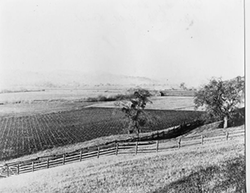
Leander Ellis serves as a Sonoma County Supervisor and as the Board's first Chairman.
In an expression of his commitment to public service, Leander deeds 1 acre of his property for $75 in gold coins the Oriental School, which is the public grammar school on the eastern (oriental) side of the Russian River.

Ellis's 25 acres (and probably everybody else's) are infected with Phyloxora and he pulls the entire acreage.
John A. Ellis, Sr., Leander and Nancy's son, weds Louis Isabel Stites.

Leander and Nancy's daughter, Leona, marries John F. Fay, son of John H. and Alice Fay.
John F and Leona Fay take title to property adjoining Leander and Nancy.
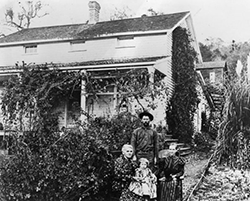
John A Ellis, Sr., farms on the Ellis property before inheriting it, but also by high industry he is also a Justice of the Peace, a Judge, a county tax offical and a member of nearly every community organization.
Following the public service commitments of his father and grandfather, John Jr. serves as Police Chief in Sebastopol.
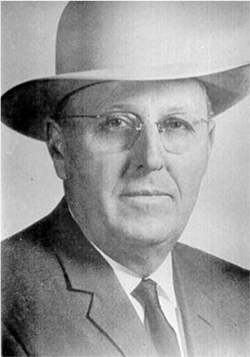
John Jr. serves as a Santa Rosa police officer and then is elected Sonoma County Sheriff on a campaign of moderization, including the use of marked patrol cars and officers in uniform.
Sheriff Ellis ends the daily prisoner chain-gang marches and hires first four female deputies.
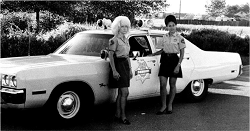
Sheriff Ellis hires the first African-American Deputy who retires in 1985 as a Sargeant and watch Commander.
(John) Morris Fay, son of John F and Leona (Ellis) Fay, wins awards for hillside Napa Gamay from block now called Coyote Ridge.

Daughter of Sheriff John Ellis Jr., Nancy Ellis Dalziel returns to Ellis Ranch to personally take over farming and wins awards for her Ellis Zinfandel and Cabernet.
Hal Hinkle purchases Fay Ranch from last resident heir of John Fay.
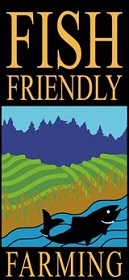
Work starts to restore 1500’ of Fay and Sei Querce Creeks. The 3-year conversion to organic of existing Fay vineyards begins. Land, water and biotic conservation plans for California Land Stewardship Institute and Fish Friendly Farming (FFF) are put to place. The ranch receives the California Certified Sustainable Winegrower certification.
Hal purchases Ellis Ranch from estate of last resident Ellis heir, Nancy Ellis Dalziel.

Two-year creek restoration project is finished. Hedge rows are planted to separate from non-organic neighbors. SQ Vineyards and Six Oaks Farm receive CCOF organic certification. First blocks are planted using averaged solar & thermal orientation for vine rows. Jesse Katz oversees the first harvest for Sei Querce wines.
Wine Country Pocket Fire burns well onto Fay Ranch, but no vineyard blocks burned. The wines suffered a smoke taint. No wine will be bottled from this vintage.
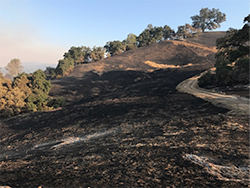
Wine Country's Kincade Fire burns onto Fay and Ellis Ranches, fortunately all fruit is already harvested, so no risk of smoke taint in the wine. No vineyard blocks burned.
California Land Stewardship Institute (CLSI) is approached to help develop a new Climate Adaptation Certification program for California wineries. Kate Nowell-Smith joins Sei Querce as winemaker to focus on hand crafted, small lot, low intervention wines.

Hinkle Charitable foundation contributes funding to CLSI to advance the Climate Adaptation Certification program.
